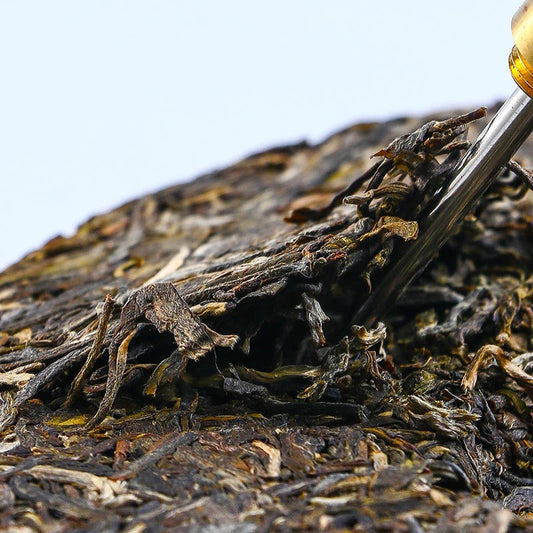Overview
Imagine sipping a cup of tea that not only tastes great but also makes the world a little better. This article explores how fair trade tea certification is changing the tea industry for the better.
We'll look at how it helps tea farmers earn more money and take care of the environment. We'll also discuss some of the challenges fair trade faces and how you, as a consumer, can make a difference.
By the end, you'll understand why choosing fair trade teas, like those from Puerh Craft, can have a positive impact on both people and the planet. So, let's dive in and discover how your daily cup of tea can contribute to a fairer, more sustainable world.
Table of Contents
- Introduction
- Fair Trade certification in Tea production
- The crucial role of ethical consumer choices
- Challenges with tea production
- The Future of Fair Trade in the Tea Industry
- Consumer Impact and Market Growth
- Conclusion
Fair trade Tea Certification in Tea Production
Fair trade certifications are pivotal in the tea industry. It safeguards the rights as well as wages of tea farmers and guides the industry towards sustainable and ethical practices. Hence, By choosing fair trade teas, consumers actively promote economic stability and social equity in tea-producing regions. These regions often face challenges like low wages and exploitative working conditions.
Trade Principles and their Impact
Moreover, Fair trade certification ensures that tea farmers receive a fair price for their produce. This provides a safety net against market volatility. With this financial stability, farmers can support their families and reinvest in community social development projects like healthcare, education, and infrastructure.
Stewardship Through Fair Trade
Sustainable agricultural practices are integral to fair trade certification. These practices help mitigate the environmental impact of tea production by reducing deforestation, conserving water, and diminishing the use of harmful chemicals. Furthermore, Certifications like Fairtrade and Rainforest Alliance ensure that tea is grown in ways that protect biodiversity and promote ecological balance, making each cup of tea a contributor to global environmental health.
In addition, organic farming methods avoid synthetic pesticides and fertilizers, enhancing soil health and reducing pollution. Such practices ensure the sustainability of tea farming, preserving the land for future generations.

The Crucial Role of Ethical Consumer Choices
Consumers wield significant influence through their purchasing decisions. By opting for fair trade certified teas, they endorse a trading system that values human dignity and environmental responsibility. Therefore, the consumer support is crucial in driving more tea brands and estates towards fair trade certificatio.
Choosing those products can be seen as a direct contribution to the fight against the exploitation in the global trade system, advocating for the rights and welfare of the marginalized workers and farmers in the tea industry.
Challenges within Tea Production
While the benefits of fair trade certification are significant, the tea industry faces several challenges that can hinder the effectiveness of these programs. One of the main issues is the reliance on large-scale plantations, which are often remnants of colonial systems. These plantations may provide some benefits under fair terms, but they still operate under a model that can perpetuate inequality and dependence. Critics argue that fair trade should focus more on empowering small-scale farmers and promoting a more equitable system that breaks away from the legacy of exploitation.
The Future of Fair Trade in the Tea Industry
To truly transform the tea industry, fair trade initiatives must evolve to better support small-scale farmers and offer more comprehensive benefits that reach all workers. This includes improving access to fair markets and increasing consumer awareness about the challenges within the tea industry. Moreover, fair trade organizations are continuously working to refine their standards and ensuring farmers can be benefited from the system. This includes developing programs that address specific local challenges, such as climate change adaptation and gender equality.

Fair Trade Premiums and Community Development
Fair trade premiums are a vital part of the fair trade system, providing additional funds that communities decide how to use. These funds have been instrumental in building schools, improving healthcare facilities, and even supporting local infrastructure projects. For example, in some tea-growing regions, premiums have been used to fund clean water projects and educational scholarships, which have a long-term positive impact on the community.
Consumer Impact and Market Growth
The growth of the fair trade tea market also depends heavily on consumer demand. As more consumers choose this option, retailers and suppliers are more likely to stock these products, thereby expanding the market. Therefore, this sends a strong signal to the industry about consumer preferences for ethically produced goods and can lead to broader changes in how tea is sourced globally.
Conclusion
As we've explored the transformative effects of fair trade on the tea industry, it's clear that every purchase counts. Choosing fair trade tea isn't just about savoring a delightful cup; it's about endorsing a system that uplifts and supports the livelihoods of tea farmers and their communities. But why stop there? You can continue to make a difference by visiting Puerh Craft, where every tea blend you choose supports these vital principles. Puerh Craft's tea quality certificate is available here.
By shopping at Puerh Craft, you're not only enjoying premium teas but also contributing to a larger movement that values people and the planet. Let's take this step together to ensure that tea farmers receive the benefits they deserve and contribute to a sustainable future for the tea industry. Your choice matters—let it be a step towards a fairer, more equitable world.
Q&A Section
Q1: What exactly is fair trade certification?
Fair trade certification ensures that producers receive fair prices for their products, significantly improving their living conditions. It focuses on better wages and working conditions, along with sustainability efforts. Crucially, this certification protects the rights and livelihoods of small-scale farmers and workers in the tea industry.
Q2: How does fair trade benefit tea farmers specifically?
Fair trade benefits tea farmers by providing a fair minimum price for their tea, shielding them from market fluctuations. Additionally, it includes a premium, which farmers can use for community and business development projects. Consequently, this leads to improved healthcare, education, and infrastructure within their communities.
Q3: Can fair trade practices impact the environment?
Yes, fair trade practices positively impact the environment by promoting sustainable farming methods. These practices reduce chemical use, protect water sources, and preserve local biodiversity. Importantly, fair trade certification often encourages organic farming, which is beneficial for the environment.
Q4: Why is it important for consumers to choose fair trade teas?
Choosing fair trade teas allows consumers to support ethical business practices, ensuring that the farmers and workers producing their tea are treated fairly. Moreover, this choice supports environmental sustainability and aids in the fight against exploitation in the global trade system.
Q&A Section: ( Part 2)
Q5: What challenges does the fair trade tea industry face?
One major challenge is the reliance on large-scale plantations, which can perpetuate outdated and exploitative practices. Moreover, fair trade products often struggle to compete with cheaper, non-certified options due to limited market access. Therefore, increasing consumer awareness and demand is crucial for overcoming these challenges.
Q6: How can I, as a consumer, contribute to the success of fair trade tea?
As a consumer, you can make a significant impact by consistently choosing fair trade certified products. Additionally, educating yourself and others about the benefits of fair trade and advocating for fair trade practices in your community are powerful steps. By purchasing from brands committed to fair trade principles, like those available at Puerh Craft, you contribute positively to the industry.






